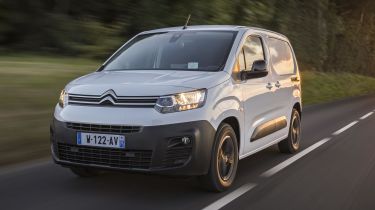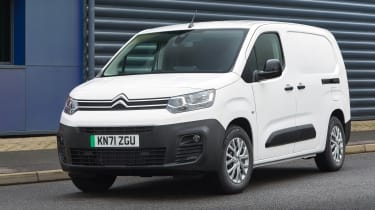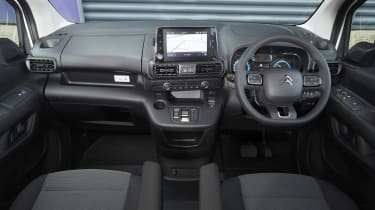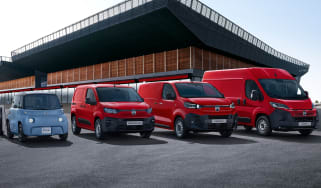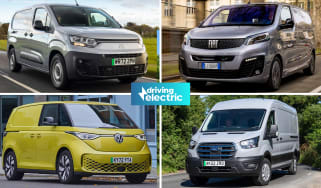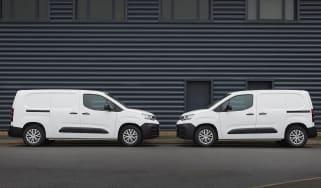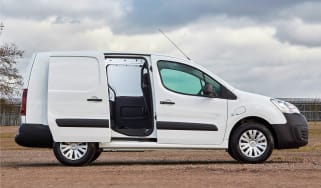Citroen e-Berlingo van review
With up to 4.4 cubic metres of cargo space and a range of 167 miles, the electric version of Citroen’s most compact panel van is a useful and versatile vehicle
Pros
- Rides well
- Decent performance
- Up to 4.4 cubic metres of space
Cons
- Fairly basic equipment
- Potentially limiting range
- More expensive than diesel
| Van type | Range | Wallbox charge time | Rapid charge time |
|---|---|---|---|
| Electric | 167 miles | 7hrs 30mins (0-100%, 7.4kW) | 30mins (10-80%, 100kW) |
Until quite recently, most of the electric vans on sale in the UK weren’t originally designed to be electric. Instead, they tended to be adaptations of existing models, with electric motors and battery packs filling the spaces where you’d have before found the engine and fuel tanks.
Things are quite different now, though. Many of the newer vans available have been developed to be electric from the outset, and as such have much greater potential to be practical, usable alternatives to their diesel counterparts.
The Citroen e-Berlingo is one such van. It has ample performance and load-hauling credentials courtesy of the e-Berlingo’s 134bhp electric motor, and the 50kWh battery allows an official range of 167 miles.
Some may still consider that too short, but it’s on par with many other small electric vans. You’ll find very similar performance and range figures in alternatives such as the Peugeot e-Partner, Fiat E-Doblo and Vauxhall Combo Electric – mainly because they’re mechanically very similar to the Citroen and sit on the same fundamental platform.
Alternatives like the Nissan Townstar EV (up to 183 miles) and Renault Kangoo E-TECH (up to 186 miles) can go a bit further on a single charge, but their ranges aren’t leagues ahead of the Citroen’s.
Fully recharging the e-Berlingo from a wallbox will take around seven-and-a-half hours, while a top up from 10-80% at a 100kW rapid charger takes around 30 minutes.
Thankfully, the switch to electric hasn’t made a dent in the Berlingo’s carrying capacity or practicality. Towing is limited to 750kg, and the standard 'M' length version has an 803kg maximum payload, along with 3.3 cubic metres of cargo space – or up to 3.9 with the passenger bench folded down. In XL guise, cargo space jumps to 3.8 cubic metres with the bench up, or 4.4 when it's folded down. However, this version also has a slightly lower maximum payload of 751kg.
The e-Berlingo isn’t lacking in performance, either. With all the electric motor’s 260Nm of torque sent to the front wheels as soon as you put your foot down, it can easily haul itself up steep inclines, even with full load of cargo on board, as we found when driving up a one-in-five-and-a-bit hill with 200kg of sand in the back.
It’s also more relaxing to drive than its diesel alternatives, with no gearshifts needed and far less vibration and noise in the cabin. Admittedly, the range-topping Driver Pro model we tried has some extra sound deadening compared to the cheaper Enterprise Pro variant, which helps isolate road noise even further.
The e-Berlingo also rides quite well, even when it’s empty, largely as a result of the battery pack’s placement under the floor between the axles. That keeps the bulk of the van's mass low down, ensuring the chassis remains settled over rougher roads.
Like all the models it shares technology with, the Citroen lets you choose from Eco, Normal and Power driving modes, which vary the amount of power and torque on tap from the electric motor. As the names suggest, Eco priorities maximising range, while Normal suits most everyday driving and Power is for when you’re carrying a heavy payload or need a bit more grunt for overtaking. There's also a 'B' mode on the gear selector, which increases the strength of the regenerative braking system to recover more energy when you slow down.
Inside, the e-Berlingo feels like well put together and built to last. The scratchy-feeling plastics are to be expected – this is still a van, after all, and feels tough enough to handle the sort of punishment it would face serving as a tradesperson's work vehicle.
For example, the climate control panel has chunky up-down toggle switches to adjust the temperature, while the buttons for the air-conditioning and demister are large and square, meaning you can still use them while wearing gloves. That's not an issue we faced on our test drive in warm French weather, but it’s reassuring to know you’ll be able to easily control the van’s functions in the colder months of the year.
There are a few versions of the e-Berlingo van available, with different body styles and lengths depending on the one you go for. The e-Berlingo range begins with the panel van version in the entry-level Enterprise Edition trim, which starts from just under £30,000 excluding VAT, but after the plug-in van grant has been deducted.
For that price, you get 16-inch steel wheels, an electronic handbrake, an eight-inch touchscreen with Bluetooth, plus rear parking sensors. Standard safety systems include cruise control and a speed limiter, among other bits and bobs. Entry-spec Enterprise Edition panel vans come in the regular M length by default, though the longer XL body length can be specified for an additional £855.
Next up is Driver Edition trim (+£1,600), which like the base model is available in both the regular M and longer XL bodystyles. Upgrading to this spec adds 16-inch alloys, a body-coloured rear bumper and a 10-inch digital driver’s display, plus all-round parking sensors and a digital rear-view monitor capable of displaying a feed of what’s going on behind the van from a camera mounted on one of the rear doors – useful given the lack of any rear windows.
There's also a Crew Van version, which can seat up to five in addition to cargo space. However, it’s only available on Enterprise Edition models in the XL body style, for just over £32,000 after the plug-in grant has been applied.
In addition to the van models, the Citroen e-Berlingo also comes as a seven-seater MPV. The extra seating capacity makes it great for families, but it won’t be of much use if you’re after an e-Berlingo for work duties; the e-Berlingo MPV is officially classified as a passenger car rather than a light commercial vehicle, so you won’t be able to claim any VAT back on it.
All things considered, the e-Berlingo is worth taking a look at if you think an electric van would suit your business. It’s relaxing to drive, just as practical as the diesel version and features an interior that's built to last. However, there's a flurry of new electric vans set to rival the e-Berlingo launching soon, including models such as the next-gen Mercedes eCitan and Ford E-Transit Courier, so we’ll have to wait and see how it stacks up against the competition.

